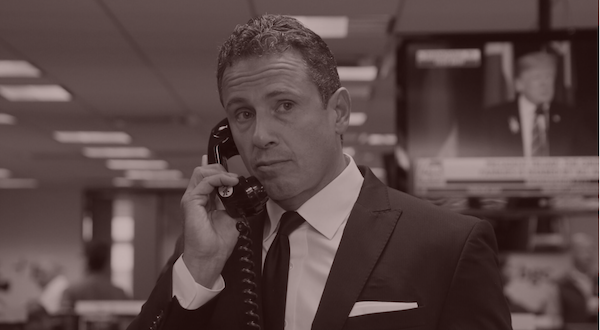|
Good evening, I'm Dylan Byers.
Welcome back to In the Room, my private email on the inner workings of the American media. Today, I'm taking a closer look at the future of CNN and MSNBC after the firing of Chris Cuomo and the looming exit of Rachel Maddow. Their replacements in the 9 p.m. hour are likely to indicate how CNN and MSNBC can reposition and secure their brands in the streaming era—and, perhaps, the future of cable news itself.
Thanks as always for your interest in Puck. You can read a free preview of my work below. Or, better yet, subscribe now to read all of my reporting in full, online or delivered directly to your inbox.
Thanks, Dylan
The existential crisis of cable news extends beyond the firing of Chris Cuomo and the exit of Rachel Maddow. Their replacements in the 9 p.m. hour will indicate how CNN and MSNBC can reposition their brands in the streaming era. Cable news, in many ways, has been the last holdout of our enduring media shift from analog to digital. Years after Amazon conquered the publishing market; a generation after Napster and then Pandora and, finally, Spotify vanquished music publishing; and just as Netflix and a coterie of aggressive second-movers decisively overtook broadcast and theatrical entertainment, cable news still survives. Part of this is somewhat miraculous. Indeed, Jeff Zucker almost single-handedly pivoted CNN from the province of warmed-over Eliot Spitzer and Piers Morgan fodder into a mainstage, albeit left-leaning, for the national conversation. At Fox and MSNBC, executives also found ways to prey upon the age-ridden insecurities and tribalism of a shrinking but nevertheless shrill audience. (Fox, with an audience larger than CNN and MSNBC combined, was particularly successful at this tactic.) As our culture pivoted to digital amid the Trump years, each network cleared more than a billion in profit.
The post-Trump hangover, of course, has been less kind. As my colleague Julia Ioffe pointed out in a previous report for Puck, not only are the ratings down precipitously, but the talent is also loose in the saddle. By now, every reader of this column knows that Rachel Maddow will be ascending to a sweeter overall-style deal with NBCU and Peacock worth around $30 million per year. Loyal readers will also know that I reported weeks ago that Joe Scarborough, the anchor talent of MSNBC’s morning lineup, is said to want to be the network’s highest-paid star, craving “$30million + 1!” Chris Cuomo’s recent defenestration merely proves that an era seems to be truly ending. As Politico’s Jack Shafer noted this week, in full-throated Howard Beale mode, a correction is coming. “Do we really want to continue to indulge an aged minority’s irrelevant obsession with who said what on cable news?” Shafer pleaded. “Can’t somebody turn the damn thing off?”
Shafer isn’t wrong that we continue to treat the stars of cable news as household names, even if many have smaller audiences than TikTokers or lower caste Kardashians. But we do so because their cultural impact reverberates beyond the tiny sliver of Americans who are tuned to cable news at any given moment. The symbiotic relationship between cable news bookers and green room addicts on Capitol Hill ensures that television continues to generate the soundbites that feed The New York Times and Twitter and partly set the day’s political-media agenda.
But there’s no question that the bloom is off the rose alongside the broader decline of the linear television model. And the Cuomo affair illustrates a number of under-appreciated points about the business...
FOUR STORIES WE'RE TALKING ABOUT As with most public breakups, there’s more to this story of the McKay-Ferrell split than bruised egos. MATT BELLONI Washington is run by an aging class of lawmakers totally unwilling to relinquish their power. But, actually, is that as bad as it sounds? JULIA IOFFE Since leading Youngkin to victory, Roe has effectively rewritten the Trump-adjacent, post-Trump campaign playbook for 2022. TINA NGUYEN A tale of the embattled Ozy founder, a turkey club sandwich, and a misadventure in crisis management. WILLIAM D. COHAN
|
-
Join Puck
Directly Supporting Authors
A new economic model in which writers are also partners in the business.
Personalized Subscriptions
Customize your settings to receive the newsletters you want from the authors you follow.
Stay in the Know
Connect directly with Puck talent through email and exclusive events.








